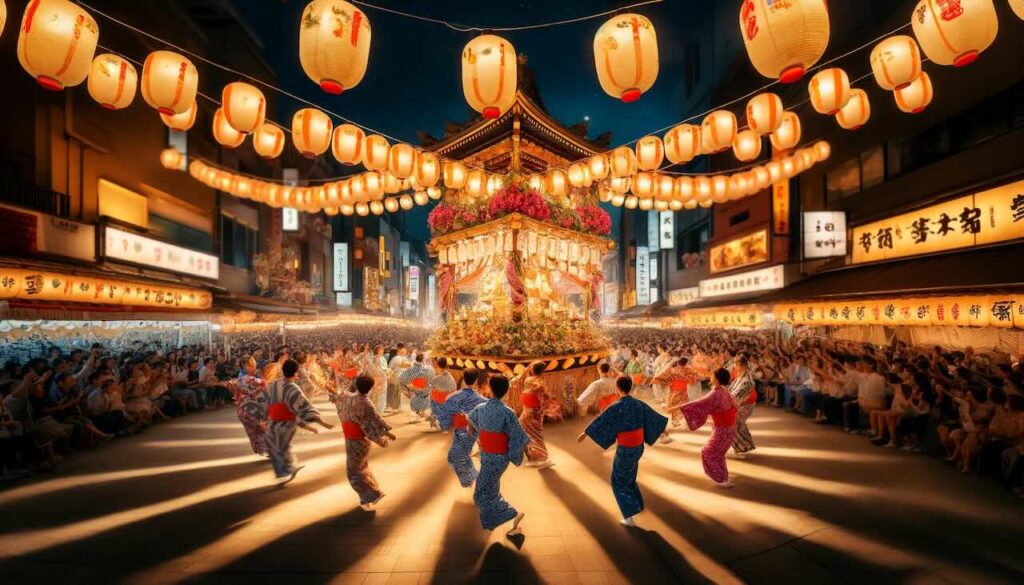As summer sweeps across Japan, towns and neighborhoods come alive with the rhythmic beats and joyful movements of Bon Odori, the traditional festival dance that honors the spirits of ancestors. But what are the roots of this cherished practice? How did it evolve—and why has it traveled far beyond Japan’s shores? In this article, we’ll uncover the rich origins, cultural meaning, and global reach of Bon Odori.
The Origins of Bon Odori: From Buddhist Ritual to Communal Celebration
Bon Odori (盆踊り), literally “Bon dance,” traces its origins back to the Nara period (710–784 CE) and is closely tied to the Buddhist custom of Urabon-e (お盆), or Obon—a time when it’s believed the spirits of the deceased return to visit the living.
Early Bon Odori began as a solemn chant-and-dance ritual called Nenbutsu Odori, performed by monks to welcome and console these ancestral spirits. Over the centuries, particularly by the Muromachi period (1336–1573), the dance became more widespread and began incorporating regional music and lively movements. By the Edo period (1603–1868), Bon Odori had become a staple of summer festivities across Japan, each area developing its own unique style and song.
The Purpose of Bon Odori: Honoring, Connecting, and Celebrating
Bon Odori serves multiple purposes, both spiritual and social:
- To honor ancestors: At its heart, Bon Odori is a gesture of gratitude and remembrance for those who came before.
- To strengthen community bonds: Dancing together around the yagura (a central raised platform) fosters a sense of unity and togetherness.
- To celebrate the summer season: With food stalls, lanterns, and yukata-clad dancers, Bon Odori is also a joyful expression of summertime festivity.
What makes Bon Odori so enduring is its accessibility—anyone, regardless of age or background, is welcome to join the circle. There are no barriers, only rhythm, repetition, and the shared joy of movement.
Bon Odori Around the World: A Global Celebration of Japanese Heritage
While Bon Odori is deeply rooted in Japan, its spirit has traveled with Japanese communities across the globe. In many countries, it serves as both a cultural celebration and a link to ancestral heritage.
Brazil
In São Paulo, home to the largest Japanese population outside Japan, Bon Odori festivals attract tens of thousands every August. Organized by Japanese-Brazilian associations, these events showcase not only traditional dance but also taiko drumming, yukata fashion, and Japanese street food.
Hawaii
Introduced by Japanese immigrants in the early 1900s, Bon Odori has become an integral part of Hawaiian summer culture. Every year, dozens of temples across the islands host Bon dances, often accompanied by live music and community potlucks—blending Japanese and Hawaiian warmth into one festive event.
Other Countries
Bon Odori festivals are also held in countries like the United States, Canada, Malaysia, and Australia, often sponsored by Japanese cultural organizations and Buddhist temples. Whether danced in a temple courtyard or a downtown plaza, the message remains the same: to remember, to rejoice, and to share in tradition.
Conclusion: A Dance Across Time and Borders
Bon Odori is more than just a summer event—it’s a living tradition that continues to evolve while staying rooted in spiritual gratitude and community joy. From its Buddhist origins to its colorful role in modern matsuri (festivals), Bon Odori invites everyone to join the circle—no experience required, just an open heart.
So this summer, if you hear the taiko drums beating and see the lanterns glowing, don’t hesitate. Step into the dance, join hands with strangers and ancestors alike, and experience for yourself the timeless, borderless magic of Bon Odori.


